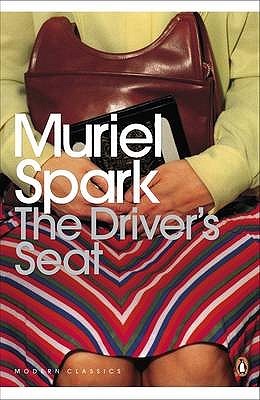Even for the notoriously cold and sometimes nasty Spark, The Driver's Seat is a bleak piece of work. Slim--barely 100 pages--all in present tense and never cutting away from its protagonist, the story starts on a shopping trip and ends with Lise dead behind a pavilion at the end of her perfect death day.
The above paragraph might seem like a spoiler but it isn't, really, since we learn most of this by the second chapter. The only real mysteries are either insignificant (Who will kill her?) or completely opaque (Why does she want to die?). And the story moves at such a breakneck pace, at such an impersonal register, that we never connect to Lise or any of her supporting cast in any meaningful way. Indeed, except for a brief moment at the very end, there's no pathos to this tale at all. From a writer with Spark's skill, this can't be accidental, not that Dame Muriel is senitmental at her softest, but it makes for a chilly read.
Is it fun? Well, parts are, and of course the potboiler structure, however predestined the ending, can't help but light up the whodunnit centers of the brain, though as Lise says of the unnamed book she carries around for the duration of her story, it's more of a "whydunnit" and that's an answer we never get. Parts are infused with Spark's merciless humor, as when one of Lise's temporary traveling companions talks about her husband getting a little too cocksure:
‘They are demanding equal rights with us,’ says Mrs Fiedke. ‘That’s why I never vote with the Liberals. Perfume, jewellery, hair down to their shoulders, and I’m not talking about the ones who were born like that. I mean, the ones that can’t help it should be put on an island. It’s the others I’m talking about. There was a time when they would stand up and open the door for you. They would take their hat off. But they want their equality today. All I say is that if God had intended them to be as good as us he wouldn’t have made them different from us to the naked eye. They don’t want to be all dressed alike any more. Which is only a move against us. You couldn’t run an army like that, let alone the male sex. With all due respects to Mr Fiedke, may he rest in peace, the male sex is getting out of hand. Of course, Mr Fiedke knew his place as a man, give him his due.’
Or when a man spends an entire plane ride trying to seduce Lise, telling her how he's her type and forcing his hydroponics obsession on her. But mostly, the tone is dry and disorienting as Lise picks up one piece of her plan after another and finally enlists the help of a psychotic she vibed with to do the killing.
SPOILERS BELOW
The killing is the only part of the story with any real weight, and it is nasty. Lise instructs him on how to tie her up, where to stab her, what to tie with the scarf and what to tie with the tie--but ultimately, even her death is taken out of her hands as he refuses--perhaps cannot not refuse--her command not to hae sex with her, and rapes her before following the rest of her instructions to the letter. So, sadly, for all her effort to exert control over her fate, she dies knowing it was all an illusion. Sad.
Spark is no stranger to aggressive foreshadowing, if what she does can even be called that, but this book, so concise and so focused on theme, strips away everything but the fatalism until the whole book begins, in retrospect, to look like an ironical joke. What was the point of the planning, the work, the actions taken, when Lise was dead before the story even started? Spark doesn't go in for explicit metafictional games but as she often does, her artistic vision includes the author as a God who is either absent, inscrutable, or cruel, but nevertheless cannot be resisted.


1 comment:
Great review. As I think more on it now, it seems clear to me that an explanation of why Lise wants to die would be to ruin it--she wants to die because she wants to be free of the imposition that the narrative, or life, places on her. Any further elaboration only shackles her more.
Post a Comment